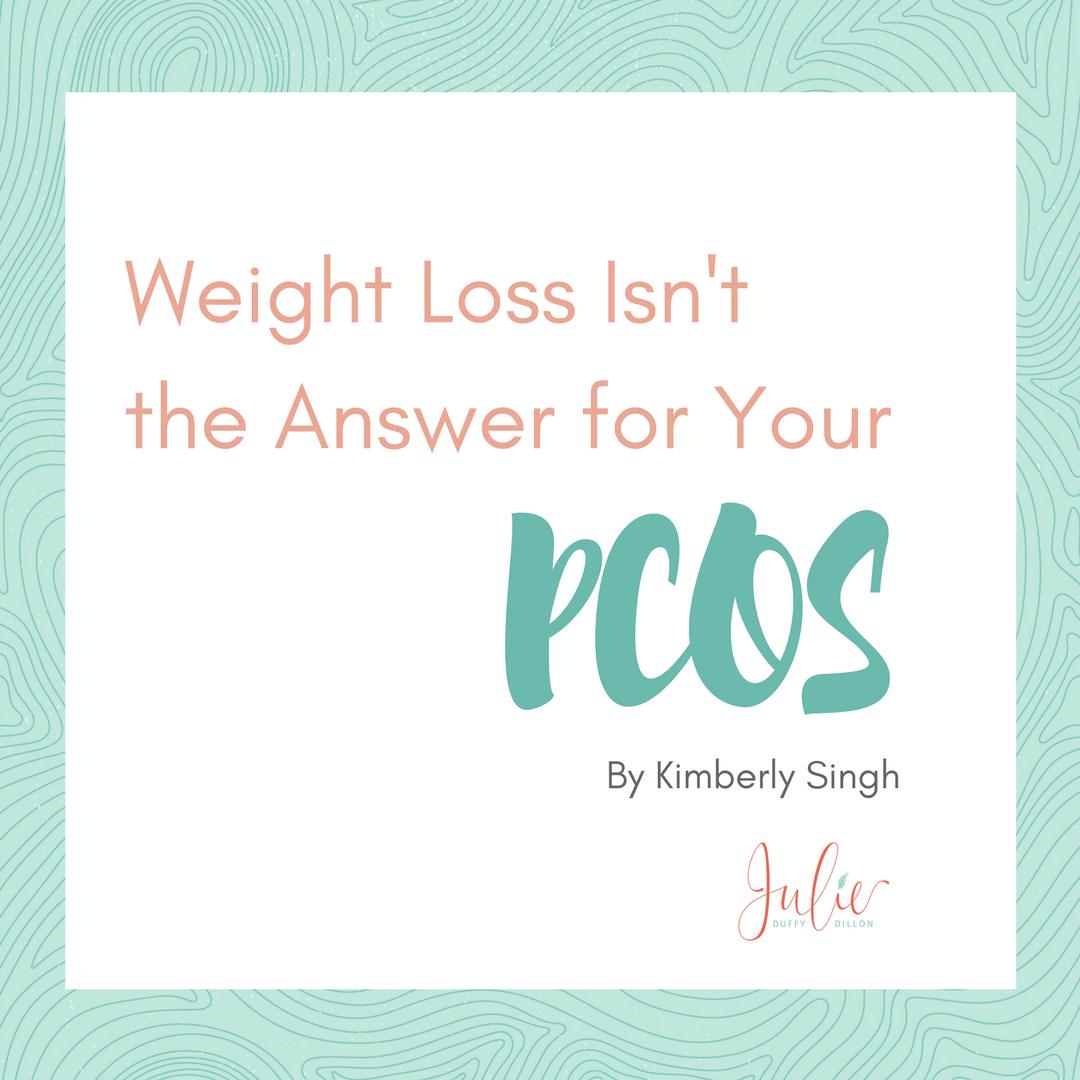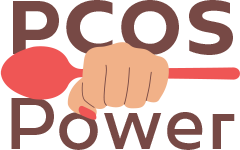Kimberly Singh, Julie’s resident nutrition grad student ⇢also affected by PCOS!⇠ is back to blogging on PCOS topics. Enjoy!
It’s that time of the year again.
Everyone is revving their engines to prepare for a new lifestyle filled with vegetables and water.
They are starting their elimination diets and shaming their prior self for indulging in things like sugar and bread (gasp).
As they start this new lifestyle with blind optimism, they are sure this time will be different.
Not like last January, or the one before that, and so on. In a few weeks to months the craze will wear off, and most dieters will be back to eating sugar and whatever else they currently deem unhealthy trash.
Sound familier?
If you have PCOS this is probably a familiar cycle.
You already know the shame and pressure to change your body’s size through restrictive dieting and rigid exercise.
As if society’s pressure to shrink yourself wasn’t bad enough, you probably have doctors promising you that all of your PCOS nightmares will end when you drop the weight.
Who wouldn’t want that?
They paint this beautiful picture of your PCOS symptoms vanishing with the proper amount of restriction. If you just do it right and long enough you will be practically cured.
However, they fail to warn you about the increased risk of eating disorders and weight cycling among dieting people with PCOS. They rarely ask about a history of binge eating disorder, which is common in people with PCOS. And last but not least, they fail to warn you that dieting causes you to ignore your body’s internal method of regulation.
Diets inherently tell you to ignore your body and listen to the blanket of shame that society throws on people of size.
Healthcare professionals prescribe weight loss for PCOS as an ultimate solution, ignoring the weight cycling that usually accompanies the PCOS experience. The reckless prescription of restrictive diets to a population at an increased risk of eating disorders causes harm to people with PCOS.
Not only does dieting lead to weight gain (the literal opposite of what PCOS dieters expect) but it also poorly affects their health.
Diets discourage people from knowing how to use food as fuel for their bodies. Julie finds that by urging her clients to observe reactions to different foods, they are able to identify how to best energize their bodies and manage their PCOS.
People with PCOS get energy from food in a different way from others, and by turning down the volume on dieting, they are able to better hear what their bodies prefer. I have found it to be helpful to log how I feel 1-3 hours after eating different foods.
Dieting can seem so appealing, especially for those of us with PCOS. It promises a whole new shiny life-a better version of yourself that is lingering inside of you and waiting to be released.
It can even sound like the only solution to your PCOS, but it is not.
You are the only solution.
You have the internal wisdom to guide yourself to health and happiness, and don’t let diet culture tell you otherwise.
As the new year begins, I urge you to ditch your diet. I urge you to stop restricting. Stop listening to messages about weight loss filled with shame, and start listening to your body.
Here are some of my favorite resources when diet culture has me in the dumps:
- Weight-neutral podcasts: some of my favorites are Love Food, Dietitians Unplugged, Food Psych, She’s all Fat.
- Lindy West’s writing has a great balance of humor and realness of the fat experience.
- Intuitive Eating (<–this is an affiliate link) is a must-have. It will help you unlearn diets.
- And last but not least: myself! When I am present and grounded with myself, I know that diets are not right. Self-compassion and mindfulness help me get through my toughest moments.
Want to find a way to treat your PCOS without dieting?
Jeanes, Y. M., Reeves, S., Gibson, E. L., Piggott, C., May, V. A., & Hart, K. H. (2017). Binge eating behaviours and food cravings in women with Polycystic Ovary Syndrome. Appetite, 109(Supplement C), 24–32. https://doi.org/10.1016/j.appet.2016.11.010
Lee, I., Cooney, L. G., Saini, S., Smith, M. E., Sammel, M. D., Allison, K. C., & Dokras, A. (2017). Increased risk of disordered eating in polycystic ovary syndrome. Fertility and Sterility, 107(3), 796–802. https://doi.org/10.1016/j.fertnstert.2016.12.014
Mann, T., Tomiyama, A. J., Westling, E., Lew, A.-M., Samuels, B., & Chatman, J. (2007). Medicare’s search for effective obesity treatments: Diets are not the answer. American Psychologist, 62(3), 220–233. https://doi.org/10.1037/0003-066X.62.3.220
Morosi, A., & Jeanes, Y. (2017). Food cravings, binge eating and emotional eating behaviours in overweight and obese women with polycystic ovary syndrome. Proceedings of the Nutrition Society, 76(OCE1). https://doi.org/10.1017/S0029665117000155






